 |
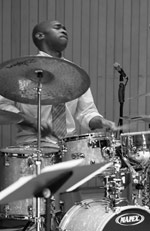 Eric Harland 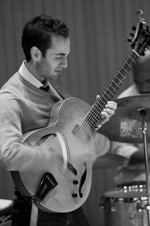 Julian Lage  Talyor Eigsti & Julian Lage 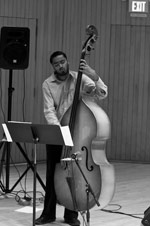 Harrish Raghavan 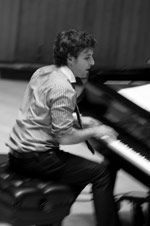 Taylor Eigsti 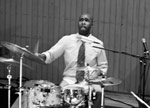 Eric Harland photos byRudy Lu click here for more |
HARLAND... Filene Concert Series Filene Recital Hall – Skidmore College Saratoga Springs, NY October 16, 2008 by J Hunter The band “Harland…” is named for drummer Eric Harland, who we’ve seen providing phenomenal foundations for Charles Lloyd and Joshua Redman, respectively. Although the Houston native writes as well as he plays, Eric is known primarily as a sideman: He’s backed up Terence Blanchard and Stefon Harris, among many others. (Blanchard opened his latest Skidmore Jazz Institute appearance with “Transform”, one of Eric’s contributions to Blanchard’s 2003 Blue Note release Bounce.) Harland’s appearance at the Filene Concert Series had elements that would stymie many veteran musicians: This time, Eric was presenting his music as a leader – something that he admitted had him nervous, despite his past successes; although some band members had played together in other groups, Harland had only recently come together as a unit, and the music was still very new to them; and the group was leaving the next day for their first European tour, so this show was the final tune-up. If the quartet was experiencing butterflies, it certainly wasn’t evident, as Taylor Eigsti and Harish Raghavan led the band into the free-form opening of “Treachery.” The pianist and the bassist exchanged notes and chords while Eric shook chimes with one hand and played cymbals with the other, using a mallet to mute the sound. Eigsti and Raghavan’s framework remained as Eric kicked in a serious groove, sending the set off to the races. Eigsti worked single figures to a wonderful distraction as Julian Lage played the opening solo, ringing our ears with echoing hollow-body guitar reminiscent of Kurt Rosenwinkel. That was the start of a one-hour marathon, as Harland played an unbroken series of tunes that – while coming from separate, distinct places – came across as a single train of musical thought. Despite their brief history as a unit, the quartet’s communication was utterly flawless, and their enjoyment of the sound (and of each other) was clear as a bell. Even when Eric took time in mid-set to introduce the band and the songs so far, the other players kept the groove of “Maiden” going softly in the background. It was no wonder they didn’t want to stop, even for a moment: Every composition – regardless of tempo or approach – was bathed in white light, with a spiritual center that reached out like a helping hand. Whether the group was rocking the hall or one player was sharing a solo moment of contemplation, the music never stopped being positive. As a result, this was the most uplifting concert I’ve seen in a long, long time. To watch Eric Harland play is to watch a man ‘in the moment”, living each note and chord that passes on the stage. You see it in his posture, in his movements, in the 10,000-kilowatt smile he flashed when a particular passage went just right. Seeing Eric build, twist, and shape a solo to improve a piece’s dialogue and drama is like witnessing live-action sculpture. I was especially pleased that there were no reed players in Harland; given Eric’s past work with Lloyd and Redman, working without reeds here helped differentiate Eric’s solo material even more. I was also happy to see Eigsti in a group format. Concord Records saddled him with the dreaded “Next Big Thing” mantle when they released Eigsti’s debut disc Lucky To Be Me a couple of years ago, which may have been why I was cool to it. But being in Harland lets Eigsti be a player instead of a wunderkind, and he takes the opportunity with relish. His solos combine technical brilliance with boundless energy, and his percussive style dovetails perfectly with Eric’s dynamic attack. Raghavan had the hardest role, to my mind, in that Eric’s primary partners in rhythm (Reuben Rogers and Matt Penman) are superheroes in their own right. Nonetheless, Raghavan’s lines were rock solid, and his own foundation work let Eric fill and freestyle at will. Linking Lage’s sound to Rosenwinkel’s is apt, given the spirituality that suffuses Brian Blade’s Season of Changes (Verve, 2008), which features some of Rosenwinkel’s best work. But while that disc plods more than it dances, Harland’s music does nothing but exhilarate, and Lage’s luminous guitar adds even more buoyancy to the affair. Jazz isn’t lumbered with pop music’s mandate to be simple, inoffensive and substance-free, the genre is a prime place to explore the darker side of human emotion. But that doesn’t mean you can’t go the other way, and make music that speaks to the lighter side of the heart and the soul. That’s what Harland is all about, and (with any luck) many more people will be touched by the divine sound of this exemplary musician and the band that wears his name. J HUNTER is a former announcer/producer for radio stations in the Capital Region and the Bay Area, including KSJS/San Jose (where he was Assistant Music Director/Jazz Programming) and Q104 WQBK/Albany. He is a frequent contributor to the web site All About Jazz and to the monthly music magazine State of Mind. He currently resides in Clifton Park. |